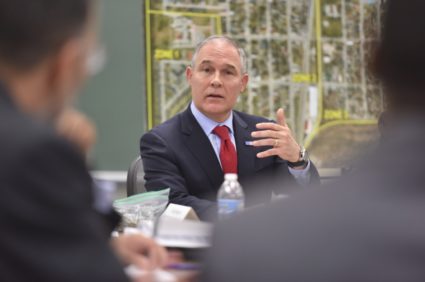
A new study claims that “unabated” global warming will make future hurricanes slower, stronger and able to hold much more rain.
The National Center for Atmospheric Research’s (NCAR) latest hurricane study predicts increased rainfall from future hurricanes will wreak havoc on a scale comparable to Hurricane Harvey last year.
Except those findings are based on a future Earth that by the end of the 21st century is nine degrees Fahrenheit warmer. That lines up with the United Nations’ “worst-case” or RCP8.5 scenario that modelers say is “exceptionally unlikely” to occur.
NCAR’s study ran two model simulations for 22 Atlantic hurricanes between 2000 and 2013. First, hurricanes were simulated in today’s climate, then simulated in a future climate that’s 9 degrees Fahrenheit warmer than today.
Results were somewhat mixed in terms of how warmer temperatures could affect hurricane strength and speed, but all the storms held more rain. On average, the 22 named storms held 24 percent more rain in a 9-degree warmer world with “unabated” greenhouse gas emissions.
“Our research suggests that future hurricanes could drop significantly more rain,” lead author and NCAR scientist Ethan Gutmann said in a statement. “Hurricane Harvey demonstrated last year just how dangerous that can be.”
Gutmann, however, also noted other research showing fewer storms in a warmer world due to increased wind shear and increased atmospheric stability.
Media outlets compared the results of the study to Hurricane Harvey, which struck southeastern Texas in late summer 2017. Harvey dumped 33 trillion gallons of water over the greater Houston area in a matter of days because it stalled over land.
Scientists have tried to link Harvey’s destructiveness to man-made global warming, but the handful of studies done on the matter largely fail to take into account the unique features that made Harvey so destructive — namely, that it stalled over land.
There are also problems with trying to attribute individual hurricanes to man-made global warming when there’s no evidence that storms are getting stronger or more intense on average.
Cato Institute’s atmospheric scientist Ryan Maue cautioned against applying the results of the study to today’s hurricanes, especially due to its use of an “extreme” warming scenario.
This study also highlights the uncertainty inherent with attribution studies or what-if scenarios. Here, 22 storms are examined finding a variety of modeled impacts based upon 9°F of global warming. These results are for a RCP8.5 extreme CO2 warming scenario for 2100.
— Ryan | weather.us (@RyanMaue) May 22, 2018
It is difficult to detect these changes in current hurricane observational data (see IPCC, GFDL) so one should be careful taking these study results as evidence of current changes to hurricanes like Harvey. (1/end)
— Ryan | weather.us (@RyanMaue) May 22, 2018
Read more at Daily Caller

















Unbelievably silly. Stalled fronts, troughs, etc., aren’t controlled by CO2. ROFL “Caution, slow hurricanes”, @SQUIDLY Good one!
Hahaha … I spit coffee all over my monitor while laughing after reading the headline.
I can see the street signs now:
“Caution, slow hurricanes”
I predict the Greens will get most crazy and more desperate as this idiotic predictions don’t happen